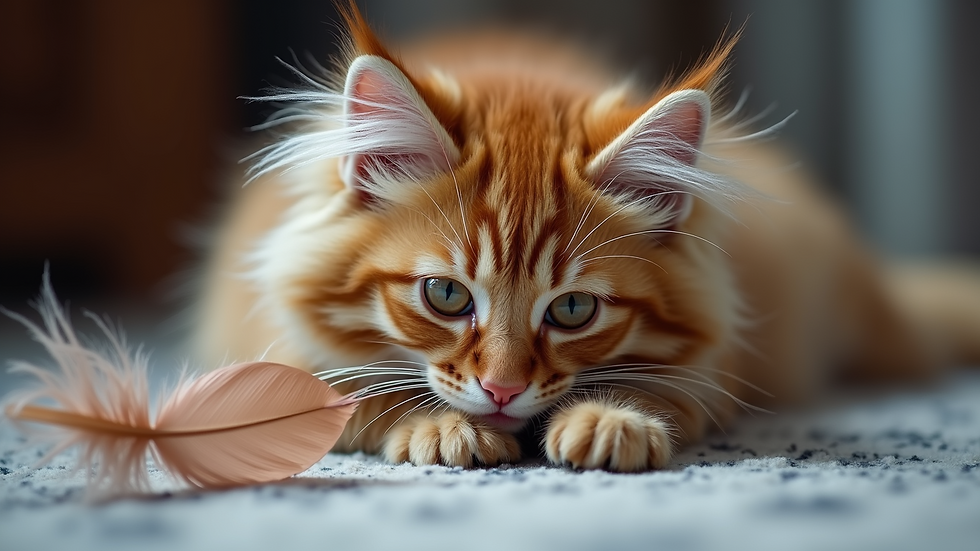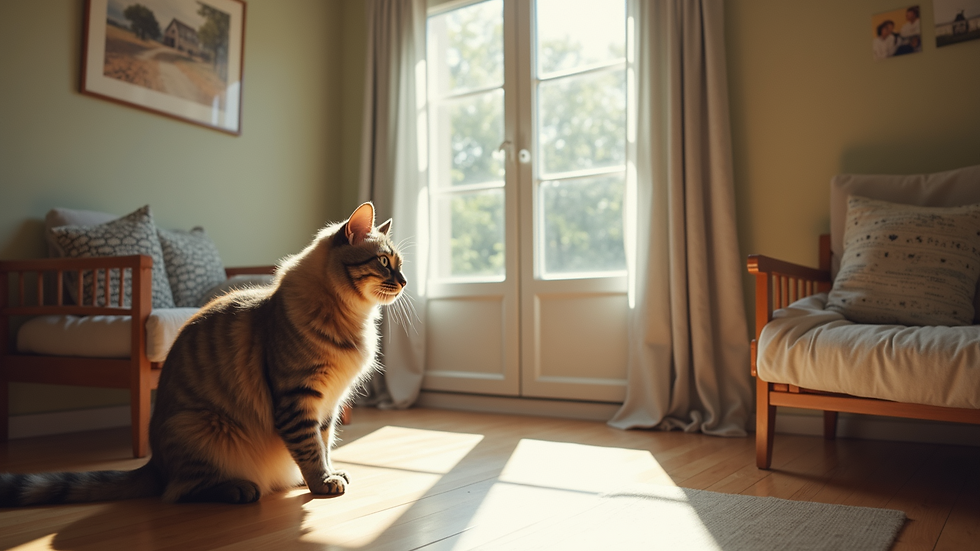Are Maine Coons Happy as Indoor Cats?
- Daimien Brown
- Jul 21, 2025
- 4 min read
Maine Coons are one of the largest and most popular domestic cat breeds. They are known for their friendly disposition and playful nature. But a question often arises for pet owners: are Maine Coons happy as indoor cats? In this blog post, we’ll delve into the behaviors and needs of Maine Coons as indoor pets, ensuring you know how to provide the best environment for your furry companion.
Maine Coons as Indoor Pets
When you think of cats, you might picture them lounging in the sun or chasing birds outdoors. However, many cat owners opt to keep their pets indoors for various reasons, including safety, health, and lifestyle considerations. Maine Coons can thrive as indoor cats if their environment is enriched and their needs are met.
Maine Coons possess a robust and sociable nature. Their friendly behavior makes them great companions for families and individuals alike. They enjoy interacting with humans and can be quite affectionate. However, fulfilling their physical and mental needs is essential to ensure they remain happy and healthy indoors.

Understanding the Needs of Maine Coons as Indoor Cats
To determine if Maine Coons can be happy indoors, it's crucial to understand their needs. These cats require more than just food, water, and shelter. Here are several important factors to consider:
Space: Maine Coons are large cats, weighing anywhere from 10 to 25 pounds. They need ample space to move around. A cramped area can lead to frustration.
Playtime: These cats are known for their playful nature. Providing various toys and engaging activities can help keep them mentally stimulated. Toys that mimic prey, such as feather wands or laser pointers, can tap into their hunting instincts.
Scratching Posts: Maine Coons need to scratch for their physical health. Scratching helps to keep their claws healthy and serves to relieve stress. Providing scratching posts in different locations can be beneficial.
Climbing Areas: Maine Coons love to climb and explore. Cat trees or shelves installed at various heights can give them a place to lounge and observe their surroundings.
Social Interaction: Maine Coons thrive on social interaction. They enjoy spending time with their owners and can even learn tricks. Regular play sessions and cuddling can foster a strong bond between you and your pet.

Can You Keep a Maine Coon as an Indoor Cat?
Yes, you can absolutely keep a Maine Coon as an indoor cat, provided you create a suitable environment. While some cats can be content with limited interaction, Maine Coons specifically require a bit more engagement.
Research indicates that cats who are kept indoors can lead long, fulfilling lives. They are often less exposed to dangers like cars, predators, or diseases. However, transitioning a Maine Coon from an outdoor lifestyle to an indoor one may take some time. Here are a few tips to ease that transition:
Gradual Introduction: If your Maine Coon has previously lived mainly outdoors, gradually introduce them to an indoor environment. Start by allowing them to spend short periods indoors and slowly increase the duration.
Safe Spaces: Designate areas where they can feel secure, such as cozy beds or boxes. This provides a familiar environment as they adjust.
Window Perches: Maine Coons enjoy watching the world outside. Setting up window perches or catios where they can safely observe the outside world can reduce their desire to escape.
Routine: Establish a consistent daily routine for feeding, playtime, and cleanup. Cats respond well to routines, making them feel more secure in their environments.
Regular Vet Visits: Keep your Maine Coon's health in check with regular veterinary visits. Indoor cats are not invulnerable to health issues, so vaccinations and check-ups are still necessary.

Behavioral Considerations for Maine Coons
Understanding the behaviors and characteristics of Maine Coons can greatly help when keeping them indoors. Being a sociable breed, these cats often form strong bonds with their families. However, they can sometimes exhibit behaviors associated with boredom or stress if left alone for extended periods.
Some common behaviors exhibited by Maine Coons include:
Vocalization: These cats are known for their unique chirps and trills. They often communicate their needs and desires through these sounds.
Playful Aggression: Playtime is crucial for Maine Coons, but it is important to monitor their play styles. They may exhibit playful aggression, especially if they are bored.
Clinginess: Maine Coons often love to follow their owners around and may show distress if left alone for extended periods. This attachment is normal but requires making sure they are not left alone too often.
To ensure your Maine Coon remains content, dedicate time to daily play and socialization. This will help ward off unwanted behaviors and reinforce the bond between you and your pet.
Enriching the Indoor Environment for Your Maine Coon
Enrichment is vital for indoor Maine Coons to keep them happy and engaged. Implementing several enrichment strategies can significantly improve their quality of life:
Interactive Toys: Toys that require them to solve puzzles for treats can stimulate their minds. Look for food-dispensing toys that engage their hunting instincts.
Training Sessions: Teaching basic commands or tricks can provide mental stimulation. Use positive reinforcement techniques to encourage your Maine Coon to learn.
Varied Environments: Alter the layout of furniture or introduce new cat furniture regularly. This change can intrigue your cat, encouraging them to explore and adapt.
Feline Friends: If possible, consider adopting another pet to provide companionship. Be cautious as introducing a new cat can require patience and slow introductions.
Nature Sounds or Videos: Providing audio or visual stimuli, like videos designed for cats featuring birds or fish, can create a more dynamic environment.
The more enriching the environment you create, the more likely your Maine Coon will thrive as an indoor cat.
Final Thoughts
Maine Coons can be incredibly happy as indoor pets with the right care and environment. By understanding their needs and ensuring they remain engaged, you can create a fulfilling life for your furry friend.
From providing ample space to exploring interactive play and ensuring regular social interaction, there are many actionable steps to take. If you've ever wondered, "are Maine coon indoor cats?", the answer is yes, they can thrive indoors under proper conditions.
Embracing the challenges of indoor living can lead to a happier, healthier Maine Coon who cherishes their time with you. The joy and companionship that these remarkable cats bring can make your efforts worthwhile.



Comments